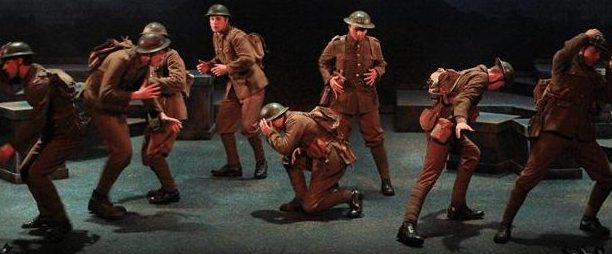Wednesday 30 July – Saturday 2 August 2014
The commemoration of the First World War in Gloucestershire was launched in entertaining style at the Everyman Theatre, Cheltenham with the premiere of Will Harvey’s War, a play adapted by Paul Milton from a long-lost novel by F.W. Harvey. The soldier poet’s faith, lust for life and romantic leanings were very much in evidence throughout the excellent portrayal of the poet, in his youth by Benjamin Crossley, and as an adult by Daniel Cane. It was fitting that the story was a clever combination of fact and fiction that evoked the humour, pathos and insight which is found in the poetry of F.W. Harvey. The choreography, staging, music from the Cheltenham Silver Band and acting by a small group of professionals together with a large cast of community players produced a mesmerising performance that appealed to all tastes.
From dealing with the death of his brother Eric, a fellow soldier, through to his capture in the First World War, there were many elements of Will Harvey’s real war, but this was played out without deference to his real life gallantry and commission as an officer. In this story, his true-life failed attempts at escape from a prisoner-of-war camp in Germany were transformed, in the second act, into an ethereal tale of love, release and homecoming. The fantasy was informed by deft touches born of his actual experience; the fugitives discovered they were safe because the railway sleepers beneath their feet were made of wood and not iron, as found under German railways.
Several familiar poems were beautifully woven into the play; The Horses, which expressed the grief Will felt at losing his father, was presented in an entirely new way as part of a clever portrayal his early life. The poet, who spent the last thirty years of his life in Yorkley, was a great walker, and it was on these walks that he ruminated on life and literature. The play presented many of the actual journeys in his life: a long walk with his brother contemplating their future, the long walk back to Minsterworth from his miserable life in Ecclestone and the long journey home after the War. The sting in the tail in the drama was that there was no happiness at the end of this final journey, and for many returning soldiers this was often the case.
This was an excellent production and no ordinary drama of mud, futility and war. It had a passion for life, and explained the useful idealism of the pre-war era. Hopefully the well-adapted drama will be seen again as it lends itself to both professional and community productions and gave enormous pleasure to the audience and participants.



